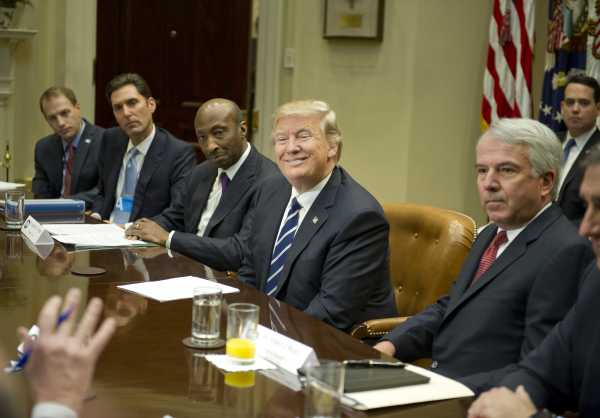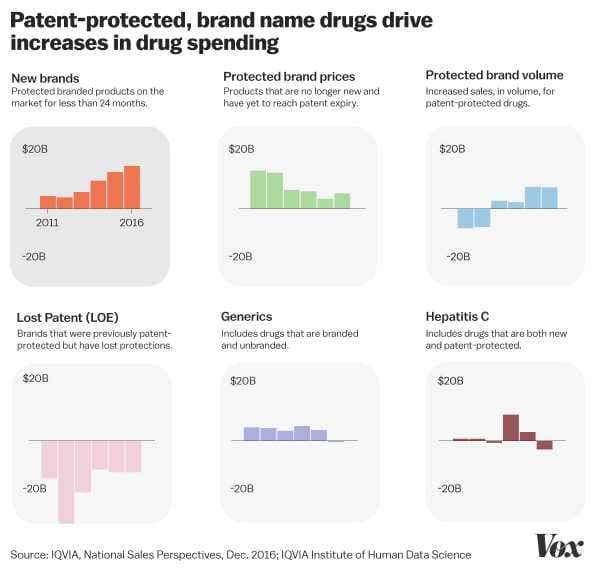
Once in a while, Donald Trump will remember he promised American voters he would bring down drug prices. But Trump’s actual agenda seems to be little more than a smattering of tweets and a white paper lacking needed details.
He can’t totally forget it because it’s popular: Polls show that voters consider lowering drug prices one of their top issues. Trump deployed pretty strong rhetoric on the campaign trail and even said big pharma was “getting away with murder” right before he took the oath of office.
But his administration is yet to propose anything that would really threaten the pharmaceutical industry. In fact, one of the world’s largest pharma companies, Pfizer, recently announced price increases for 100 drugs — shortly after Trump had said that drug companies would soon make huge, voluntarily price cuts.
Trump, perhaps suddenly remembering his campaign promise, responded this week by attacking the company on Twitter.
Trump otherwise seems to forget about this issue for months at a time. He’s only tweeted about “drug prices” four times this year, staying silent for long stretches. For context, Trump has tweeted about the Robert Mueller “witch hunt” more than 60 times in 2018. It took a pretty humiliating news story to bring his attention to drug prices. The best response he had was a tweet, which apparently got him on the phone with Pfizer’s CEO to negotiate a price-hike delay.
In fairness to Trump, lowering the prices of prescription drugs is really hard. Presidents before him have tried and failed to tackle this problem. Some didn’t even try. Trump campaigned on lowering drug prices, but to have the kind of effect he promised, he might need to be willing to enact truly radical change for drug manufacturers. But the Trump administration, populated by officials who used to work in the drug industry, doesn’t seem like it’s interested in trying anything so bold.
Trump versus Pfizer, explained
Trump found himself in this situation because he had made another big promise on drug prices. He claimed in May that drug companies would soon voluntarily lower their prices. “Massive” cuts. He said this shortly after his administration finally released an otherwise-disappointing policy plan to deliver on that campaign promise to bring down drug prices.
But reducing drug prices is hard, and Trump’s plan wouldn’t really do it. It would move money around in the health care system, within an ecosystem of health insurers and drug companies and pharmacy benefits managers. It could make changes to, for example, the out-of-pocket costs that seniors who have a private insurer covering their Part D benefits must pay.
This is a complex world. Which is why Trump tried to make it simple, as he likes to do: Drug companies are just gonna lower their prices!
It was ridiculous, and then Pfizer embarrassed him when they announced price hikes. They didn’t just not cut their prices. They announced they were raising their prices.
That awakened Trump, who had tweeted about drug prices twice in the last six months.
Pfizer stocks dipped for a second after the Trump tweet. But, in a sequel to the market’s apathetic response to Trump’s much-hyped drug pricing plan, they quickly rebounded. It seems traders have figured out that the Trump administration is not a sustained threat to pharma’s bottom line.
Pfizer ended up agreeing to postpone its price hikes for now. The president was happy to take credit for that news, even if all he had really won was a temporary delay. Certainly not a “massive” cut.
“It’s not much of a policy win,” Rachel Sachs, a Washington University in St. Louis law professor who follows the drug prices policy debate, told me by email. “A temporary rollback in price increases by one company is far from the ‘voluntary, massive’ drops in drug prices he predicted would come several weeks ago.”
Trump doesn’t have great ideas about how to make an impact on drug prices
The Pfizer price hikes are delayed until the end of the year or the implementation of Trump’s blueprint, whichever comes first. It’s almost a challenge to the administration to actually do something about drug prices. They have a white paper, but there isn’t a ton that’s really actionable in there. Details were lacking in places. Congress would need to get involved for some policies.
“The blueprint was a broad look at a number of different policy options, many quite aspirational and vague, that the administration might want to pursue. Much of it would require legislation,” Sachs said. “The administration could move forward on isolated elements of the blueprint by the end of the year, but it’s hard to imagine significant change will happen in that timeframe.”
They will cut around the edges. They can rightfully shame insurance companies when seniors have to pay thousands of dollars for prescription drugs because of holes in their insurance benefits. They can score points for going after pharmacy benefits managers, profitable middle-men whose very existence only serves to make this entire world more imperceptible to normal people and add to their frustrations.
But nobody has great ideas about how to actually bring down the list prices that drug manufacturers set. The absence of any meaningfully specific policy proposals on that issue in Trump’s plan is telling: It suggests requiring drug makers to disclose list prices in their advertising. That’s about it. The difference between the list price set by a drug maker and the price actually paid by a patient is a complicated one, but list prices still set the bounds of the market.
List prices, which are also easy for people to understand, always seem to go up. We don’t meaningfully restrict them for brand-name drugs that were recently developed, giving them a patented monopoly that lasts for the better part of a decade or more. The market will bear what the market will bear. Generics and rebates can only reduce costs so much, particularly for those newer drugs still protected by their patent.

We set up this system for a reason. We want biopharma companies to have an incentive to produce breakthrough treatments. Higher prices allow them to recoup their research-and-development costs. Scientists have in recent years basically cured diseases like hepatitis C.
But that treatment’s list price was $84,000, more than the median American makes in a year. It put a strain on state budgets, as Medicaid programs struggled to pay for the cure to a disease that disproportionately affects low-income people. And we know that pharma companies also spend plenty of the money they make on these high prices on executive compensation and advertising, and that drug companies sometimes seem to be trying to game the patent system to extend their price monopolies.
People care about this stuff because it’s life and death. And pharma is an easy villain; even Trump recognizes that. But the truth is this problem is hard. The most interesting idea I’ve heard — endorsed by libertarian Cato Institute scholars and Bernie Sanders — is to move to a totally new system, where drug companies literally win a “prize” when they develop a new drug. Short of that, it seems like we’re chipping away at the edges. You almost can’t blame the Trump administration for its uninspiring blueprint.
“The administration is proposing to take very few actions that would impact pharmaceutical companies’ bottom lines,” Sachs told me when the plan was released.
The truth is Trump has been pretty pharma-friendly
That’s why at the end of the day, all Trump really did was publicly shame a company into holding off another price increase for a while. It’ll probably be a bit before we see the president focus on drug prices again, at least with the same gusto he talks about the Russia investigation or illegal immigration.
Maybe it shouldn’t surprise us that the Trump administration, in an initiative overseen by a former pharma executive, isn’t taking radical action to fix this problem. We haven’t even mentioned yet here how well pharma came out in the Republican tax bill or the pictures of Trump grinning as he sat at a table of drug CEOs at the White House, less than two weeks after he got into office. One high-ranking industry official told me earlier this year that there had been “an education of Mr. Trump” since he became president.
It comes through in the policy decisions of his administration. Last week, in a more or less up-and-down decision on a state proposal to toughen Medicaid negotiations with drug makers, the Trump administration declined to approve the pharma-opposed plan. Sachs contrasted the Centers for Medicare and Medicaid Service’s reluctance with the agency’s eagerness to approve state proposals that would require Medicaid beneficiaries to work.
“They’ve bent over backwards to approve work requirements and make it easier for states to exercise many flexibilities to kick people off Medicaid,” she told me last week. “But when it comes to the interests of the pharmaceutical industry, all of a sudden the government is very worried about giving states the same kind of flexibility.”
With the Pfizer situation, for now, we wait and see if the Trump administration will take some meaningful action, or if we will just see prices go up at the end of the year.
Sourse: vox.com






